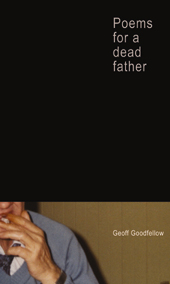 Poems for a Dead Father by Geoff Goodfellow
Poems for a Dead Father by Geoff Goodfellow
The Vulgar Press, 2002
A mate of mine said there's nothing more artful than seeing a bloke deliver a left hook. I debated the point. I thought the artfulness went out of the punch when it connected with someone's jaw in a pub brawl and sent teeth spraying around the bar. He agreed: the artfulness was in the action of the punch through the air.
I think that last sentence also describes Geoff Goodfellow's Poems for a Dead Father. There's a violence and muscularity implicit in this collection as the words swing artfully through the air. But instead of connecting with your jaw they find a place deeper down, somewhere near your guts.
The only other collection of Goodfellow's I'd read was Bow Tie and Tails (Wakefield Press, 1989). I enjoyed the direct language, the vernacular subjects (nannas, blokes in pubs, kids in youth training centres). It was a bit of an awakening to see that there are ways of dealing with subjects such as these without resorting to slang clich?©s or burying the emotion in prosaic wank.
Poems for a Dead Father (shortlisted in The Age Book of the Year Award) sees Goodfellow profile his father a few years after John Goodfellow's death. The result is funny, tender, gutsy and honest (and a whole lot better, it's got to be said, than looking at Goodfellow wearing red Speedos in the picture for his Good Weekend profile).
The book slips into gear about page 28. That's not to say everything's wasted before that. 'Scaled Down' is a clever piece about his father's size in his coffin and 'Johnny's Reply' gives us John's first-person vernacular. And there won't be many Gen-Xers who have older baby-boomer Dads or still living grandfathers that can't relate to 'Work it Out':
I never knew when he was
serious
& it seemed neither did he
what do you really mean?
I'd ask him
life's a crossword puzzle
work it out he'd say
work it out.
But 'Learning to Live' is the poem that sets the tone for the rest of the 71-page collection. It deals with the poet's father's muted violence and its effects on the family and neighbours. The rest of the book, while affectionately providing a character study of John Goodfellow, revolves around the World War II veteran's post-traumatic stress and the stress it caused to people to whom he was close. In these days of wars and rumours of wars, Poems for a Dead Father stands as a testament to the way in which not only participants in war are affected by its horror, but also the participant's families (see the poem 'Miles Away').
It almost goes without saying that this collection also provides an insight into Anglo-Australian working class culture. It does that and most especially through that same culture's dry humour. Goodfellow's lived humour and vernacular is a welcome relief from the cultural stereotyping and mocking of Anglo-Australian culture present in so much popular film and television comedy.
For all its appearance of plain speech, Poems for a Dead Father is a finely crafted work that takes the reader on an emotional journey that's never mawkish or sentimental. The tenderness and honesty in this work means that, before you know it, you've let your guard down and copped a punch from Goodfellow-and his Dad.









